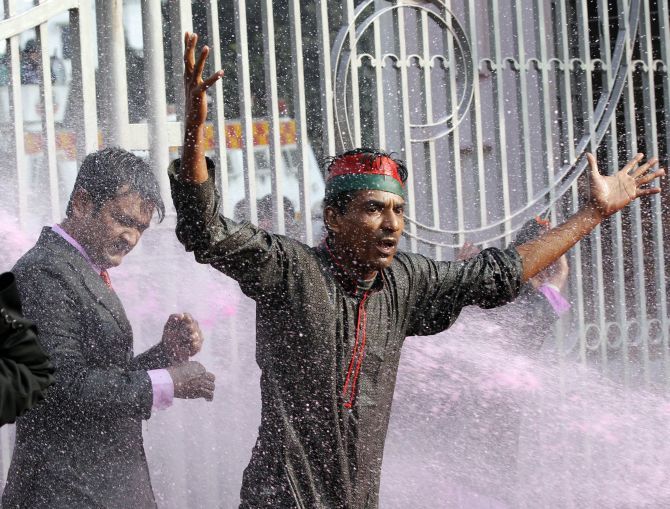Bangladesh's decision to execute Jamaat-e-Islami chief Motiur Rahman Nizami for war crimes committed in 1971 has provoked anger across the Muslim world -- expected rage in Pakistan and unexpected condemnation from Turkey's President Erdogan who hailed Nizami as a 'mujahid.'
Foreign Secretary S Jaishankar arrived in Dhaka hours after the execution, an important expression of India's support to Prime Minister Sheikh Hasina, explains Rajeev Sharma.

On May 10, Bangladesh executed the senior-most Islamist leader Jamaat-e-Islami chief Motiur Rahman Nizami for war crimes committed during the Liberation War of Bangladesh in 1971.
Interestingly, Indian Foreign Secretary Subrahmanyam Jaishankar was in Dhaka the very next day for a two-day visit during which he met Prime Minister Sheikh Hasina, Foreign Minister Mahmood Ali and other senior officials.
Jaishankar's prompt visit was India's way of telling the Hasina government that it fully supports the efforts to bring the perpetrators of the '71 atrocities to justice.
The foreign secretary's visit at this juncture is important diplomatic symbolism and expression of India's solid support to Hasina at a time when Pakistan and her arch rival Begum Khaleda Zia have upped their ante against her government.
The next few weeks will be crucial for Bangladesh as Begum Zia and the Jamaat-e-Islami Bangladesh are expected to unleash a wave of violent protests across the nation to avenge Nizami's execution.
Nizami's trial began six years ago. He is the fifth top perpetrator to be executed, after his final appeal against his death sentence was rejected by Bangladesh's supreme court and he refused to seek presidential clemency.
Significant repercussions are expected which may destabilise Bangladesh. The legal exercise of bringing 1971 war criminals to book is seen by pro-Islamists like the Muslim Brotherhood as being the handiwork of the Hasina government claiming that the lawsuits are aimed at exterminating Islamist groups.
Questions are raised why nothing was done for 45 years after the crimes were committed, if at all they were committed as is being claimed. Many of those indicted for war crimes held ministerial and official positions in the government. The naysayers -- and their numbers are significant -- dub the legal exercise as a war on Islam.
Leaders of Begum Zia's Bangladesh Nationalist Party, an ally of the Jamaat-e-Islami Bangladesh, cancelled programmes to avoid being intercepted by the media, fearing questions about their reaction to Nizami's execution. A couple of leaders, when contacted by the local media, declined to offer comment except to say that it was done as per the supreme court's judgment.
Pakistan is expectedly unhappy with the events in Bangladesh. 'The leaders who have been hanged or sentenced by the Bangladesh government committed the crime of showing loyalty to Pakistan 45 years ago,' Interior Minister Chaudhry Nisar said, alluding to the fact that Bangladesh was then East Pakistan, part of the Pakistani nation.
Pakistan's national assembly passed a unanimous resolution, condemning Nizami's execution.
Within Bangladesh the execution saw some angry reactions and scattered violence by Nisami's supporters. At Dhaka's main mosque, about 300 men who gathered to offer prayers, shouted slogans that his death should not go in vain.
Human rights groups say the legal procedures followed during the war crimes trials in Bangladesh fall short of international standards. The Hasina government maintains that the trials are supported by Bangladeshis, evident by the fact that Nizami's execution was cheered by hundreds of people on the streets of Dhaka.
The US reaction has been one of caution. While it supported justice being carried out, the State Department -- which recently dispatched its top diplomat for the region, Nisha Desai Biswal, to Dhaka after the wave of Islamist killings of liberal voices -- said it was vital that the trials were free, fair and transparent and conducted in accordance with international agreements.
While Bangladeshis affected by the crimes committed in 1971 will derive some solace with each execution of its perpetrators, the Bangladesh Nationalist Party, the Jamaat-e-Islami Bangladesh and its patrons in Pakistan will prepare for opportunities to extract retribution.
Rajeev Sharma, an independent journalist and strategic analyst, tweets @Kishkindha










